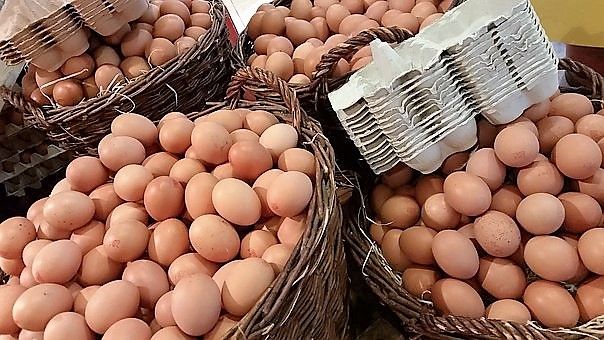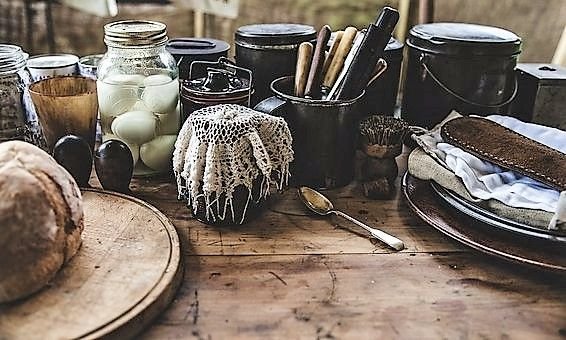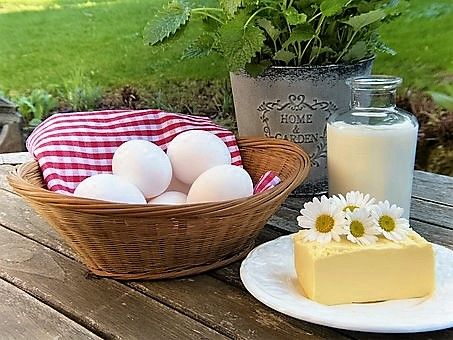HOMESTEAD/PREPPERS-- No refrigeration needed egg preservation from the 18th century

Egg preservation goes back centuries. These are the top 6 preservation techniques from the 18th century that were most commonly used. Starting with number six and going to the number one way which can still be used today!
Several things to keep in mind before preserving any eggs. Egg preservation starts in the nest. Keeping a clean nesting area for your chickens is a vital key. The egg shells are porous which can allow bacteria or mold spores in and moisture to go out. Neither of these can happen in order to maintain healthy stores.
When an egg is layed it has a natural protective coating.
Eggs naturally have a protective coating but that only lasts so long and protects so much. Pick only clean eggs for these processes and you will want to wash the eggs in a mild soap and water solution. Allow the eggs to dry and begin.

6
SALT
By putting eggs in a dry salt solution or even a salt brine you can extend the life of the eggs for a couple of months. Only drawback is that it may make your egg taste more like salt and since the egg shell is porous it may also draw out moisture. Maybe not the best technique but will work in a pinch.
5
WHEAT BRAN
This was more commonly used but again gives the eggs a different taste. Putting the eggs in a bucket of Wheat Bran will work for months possibly up to 8 months but you will have loss. Possibly only 30% of the eggs will be good for consumption.
4
COATING EGGS
This was also an 18th century technique by using a shellac or varnish to coat the egg and close the pores. Not recommended to use today unless it is a food grade coating. Coating the egg and then wrapping in paper was most commonly done. 8 month shelf life.
3
RENDERED FAT
Again this is used as a coating and one of the top ways to preserve. Using tallow or rendered fat was one of the most common ways. Safer to use and an 8 month or more shelf life if eggs kept in a cool location. 60% success rate when doing this way.
2
WOOD ASH
The second best way was using wood ash. This had the highest success rate of all techniques except for the number one way. You can get up to 9 months preservation with an 80% success rate meaning 80% will be good. Super cheap and works well. Bury them in a bucket of wood ash that has been cooled. Keep in a cool dry place.
1
SLAKED LIME
The number 1 best way to preserve eggs in the 18th century was slaked lime. By sticking the eggs in Hydrated or slaked lime eggs can last years. Some tests show that after 2 years 100% of the eggs were still good to eat. Best way to do this is to use several Tablespoons of Hydrated lime to a gallon of fresh clean water. Mix well and pour over the eggs. Make sure you have a container with a lid to help keep moisture from evaporating. Some may also use a couple teaspoons of oil on top of the water solution to help slow evaporation. Do not let water level fall below the eggs.

There you have it. The top 6 ways from the 18th century. I would tend to stick with the top 3 for best results!
Thanks for looking and as always--
Upvote, comment and resteem!
![U5ds9ZQHm7eNGwPQffqcCiMuUYxqJ4K.gif]
( )
)

All photos courtesy of Pixabay free anywhere to use photos
The Walking dead should have a prepped character so they could impart this type of useful information. It would be more interesting.
Yeah they should have that. :)
Thank you for gifting this post to the world @saved4newlife! In return, we offer you a gift of 50.0 Ohm, a cryptocurrency similar to Bitcoin.
If you would like to accept our gift, please reply to this Comment with your Ohm Wallet Address. If you would like to setup an address or learn more about Ohm, check out the Ohm Wallet FAQ.
We have also Upvoted and Resteemed your post so that your post can reach more people! Follow @maxwellbeing to see all posts which have been offered Ohm for uplifting humanity.
I do not wash my eggs and they keep for months on the counter. If one gets wet from rain I use it right away but I think that natural coating , if kept intact, will preserve the eggs unrefrigerated.
It does for awhile depending on where it is kept. They used to coat eggs in oil to take across the prairies by wagon train. Yes use the wet ones or the ones that had to be washed right away. The rest can be stored. :)
If I die from salmonella poisoning I will not be making any more comments.
LOL
I have kept clean unwashed eggs for months also this way. I never did die, yet, either.
When I share them with others I think they keep them in the fridge even though I tell them this.But at least I keep my supply down.
At one point, by various additions of a few at a time, I had a couple dozen hens and half a dozen roosters. I had eggs of every color, and in plenty. It does not take very long to build up a terrifying mountain of eggs when you get a couple dozen every day.
I was almost grateful to the raccoons that thinned the herd, when they penetrated my defenses.
We tried free ranging the chickens and add new ones every year as the predators have taken them. I am down to just one damaged chicken from a dog attack and she is now in the coop. One egg a day is manageable.
Being grateful haha I understand that!!
Wow this is a great post. Thanks for sharing this ancient knowledge on preserving eggs. Beautiful photos also.
Thanks for looking!
I had no idea that eggs could be kept fresh so long! Thanks.
You are welcome!
You should definitely not do this with eggs you buy from the store (at least here in the US).
"US eggs would be illegal in Europe due to an egg-washing process that may actually make them more susceptible to contamination with bacteria like Salmonella."
The rest of this article explains why: http://articles.mercola.com/sites/articles/archive/2013/12/07/refrigerating-chicken-eggs.aspx
If you haven't spent hours digging through the Mercola web site, you should.
Very good advice. I should add that in. You are totally right. The eggs I was referring to were farm fresh ones for sure. I hope people realize that since I was referring to the 18th century that I was talking about farm fresh. I'll check the site. Thanks.
I miss our chickens.
You couldn't buy eggs like those at any price and they were better entertainment than 99% of what you find on the TV or internet.
Slaked like it is then , next on my order list
Makes me wonder why they never used bees wax?!?!
That actually sounds like a great idea. I mean they used it to seal jelly so why wouldn't it work. I'm sure they probably tried it. Maybe you could run your own experiment! That would be interesting.
One day if I ever have a proper place for storage, like a root cellar (and my own beehive going!), that would be a great idea to try!